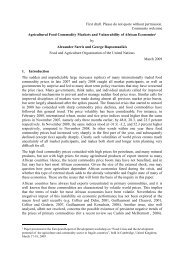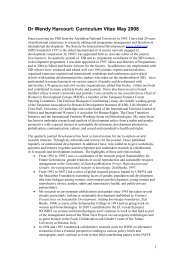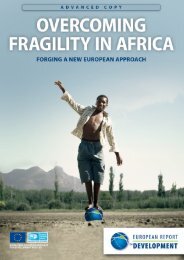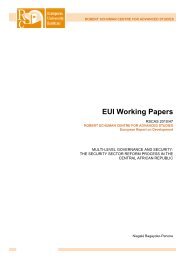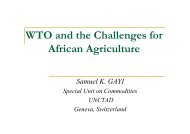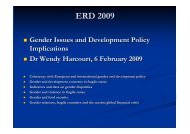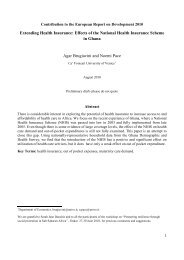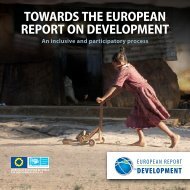SILPNUMO ĮVEIKIMAS AFRIKOJE - European Commission - Europa
SILPNUMO ĮVEIKIMAS AFRIKOJE - European Commission - Europa
SILPNUMO ĮVEIKIMAS AFRIKOJE - European Commission - Europa
Create successful ePaper yourself
Turn your PDF publications into a flip-book with our unique Google optimized e-Paper software.
2009 m. Europos ataskaita dėl vystymosi<br />
Šaltiniai<br />
TVF. 2009. Pasaulio ekonomikos apžvalga – krizė ir atkūrimas.<br />
Vašingtonas: TVF.<br />
Weeks, J. 2008. Economics Effects of Copper Prices on the Zambian<br />
Economy: Exchange Rate Regime and Kwacha Appreciation.<br />
Dokumentas, pateiktas tarptautiniame seminare dėl pagrindinių<br />
prekių rinkos iššūkių ir perspektyvų pasaulio ekonomikoje –<br />
Alfred Maizels atminti skirtas seminaras. Rytų ir Afrikos tyrimų<br />
mokykla, rugsėjo 19–20 d., Londonas.<br />
Weeks, J., V. Seshaman, A. C. K. Mukungu ir S. Patel. 2007. Kwacha<br />
Appreciation 2005-2006: Implications for the Zambian Economy.<br />
Pranešimas, parengtas Jungtinių Tautų vystymo programai,<br />
Lusaka.<br />
Zambijos eksporto valdyba. 2007. Exporter Audit Report. Lusaka:<br />
Zambijos eksporto valdyba.<br />
3 SKYRIAUS ŠALTINIAI<br />
Acemoglu, D., S. Johnson ir J. A. Robinson. 2001. “The Colonial<br />
Origins of Comparative Development: An Empirical Investigation.”<br />
American Economic Review 91 (5): 1369–1401 p.<br />
Anderson, L. 2004. “Antiquated Before They Can Ossify: States<br />
That Fail Before They Form.” Journal of International Affairs 58<br />
(1): 1–16 p.<br />
Angeles, L. ir K. C. Neanidis. 2009. “Aid Effectiveness: The<br />
Role of the Local Elite.” Journal of Development Economics<br />
90: 120–134 p.<br />
Bayart, J.-F. 1999. “The ‘Social Capital’ of the Felonious State.”<br />
leidinyje The Criminalization of the State in Africa, ed. J.-F. Bayart,<br />
S. Ellis ir B. Hibou. Bloomington: Indianos universiteto leidykla.<br />
Barfield, T. J. 1993. The Nomadic Alternative. Englewood Cliffs:<br />
Prentice Hall.<br />
Bertoli, S. ir E. Ticci. 2009. The Fragile Consensus on Fragility.<br />
Europos ataskaitos dėl vystymosi 2009 m. grindžiamasis<br />
dokumentas.<br />
Briscoe, I. 2008. “The EU Response to Fragile States.” <strong>European</strong><br />
Security Review 42: 7-10 p.<br />
Cammack, D., D. McLeod, A. Rocha-Menocal ir K. Christiansen.<br />
2006. Donors and the ‘Fragile Sates’ Agenda: A Survey of<br />
Current Thinking and Practice. Pranešimas, pateiktas Japonijos<br />
tarptautinio bendradarbiavimo agentūrai. Londonas: Užjūrio<br />
plėtros institutas.<br />
Clapham, C. 1996. Africa and the International System. Kembridžas:<br />
Kembridžo universiteto leidykla.<br />
Collier, P. 2009a. Wars, Guns, and Votes – Democracy in Dangerous<br />
Places, Niujorkas: „HarperCollins“ leidykla.<br />
Collier, P. 2009b. The Political Economy of Fragile States and<br />
Implications for <strong>European</strong> Development Policy. Europos ataskaitos<br />
dėl vystymosi 2009 m. grindžiamasis dokumentas.<br />
Dollar, D. ir V. Levin. 2006. “The Increasing Selectivity of Foreign<br />
Aid, 1984–2003.” World Development 34 (12): 2034–2046 p.<br />
Easterly, W. E. 2000. Can Institutions Resolve Ethnic Conflict?<br />
Pasaulio banko politikos tyrimų darbo dokumentas Nr. 2482.<br />
Pasaulio bankas, Vašingtonas.<br />
Englebert, P. ir D. M. Tull. 2008. “Postconflict Reconstruction in<br />
Africa – Flawed Ideas about Failed States.” International Security<br />
32 (4): 106–139 p.<br />
Herbst, J. 2000. States and Power in Africa. Prinstonas: Prinstono<br />
universiteto leidykla.<br />
JTAEK. 2007. Relevance of African Traditional Institutions of<br />
Governance. Adis Abeba: JTAEK.<br />
Kaplan, S. 2009. Enhancing Resilience in Fragile States. Europos<br />
ataskaitos dėl vystymosi 2009 m. grindžiamasis dokumentas.<br />
Lange, M. K. 2004. “British Colonial Legacies and Political<br />
Development.” World Development 32 (6): 905–922 p.<br />
Lugard, F. 1922. The Dual Mandate in British Tropical Africa.<br />
Londonas: W. Blackwood and Sons.<br />
Luling, V. 1997. “Come Back Somalia? Questioning a Collapsed<br />
State.” Third World Quarterly 18 (2): 287–302 p.<br />
Mamdani, M. 1996. Citizen and Subject – Contemporary Africa and<br />
the Legacy of Late Colonialism. Londonas: James Currey.<br />
Myrdal, G. 1972. Asian Drama: An Inquiry into the Poverty of<br />
Nations. Londonas: Allen Lane.<br />
Newbury, C. 1998. Ethnicity and the Politics of History in Rwanda.<br />
Africa Today 45 (1), 7–24 p.<br />
North, D. 1990. Institutions, Institutional Change and Economic<br />
Performance. Kembridžas: Kembridžo universiteto leidykla.<br />
Nunn, N. 2007. “Historical Legacies: A Model Linking Africa’s<br />
Past to Its Current Underdevelopment.” Journal of Development<br />
Economics 83 (1): 157–175 p.<br />
Nunn, N. 2008. “The Long-Term Effects of Africa’s Slave Trades.”<br />
The Quarterly Journal of Economics 123 (1): 139–176 p.<br />
Nunn, N. ir D. Puga. 2009. Ruggedness: The Blessing of Bad<br />
Geography in Africa. Nacionalinio ekonomikos tyrimų biuro darbo<br />
dokumentas Nr. 14918. Kembridžas: Nacionalinis ekonomikos<br />
tyrimų biuras.<br />
Nunn, N. ir Wantchekon, L. 2009. The Slave Trade and the Origins<br />
of Mistrust in Africa. Nacionalinio ekonomikos tyrimų biuro darbo<br />
dokumentas Nr. 14783. Kembridžas: Nacionalinis ekonomikos<br />
tyrimų biuras.<br />
Paris, R. 2002. “International Peacebuilding and the ‘Mission<br />
Civilisatrice’.” Review of International Studies 28 (4): 637–656 p.<br />
Putnam, R. 1993. Making Democracy Work: Civic Traditions in<br />
Modern Italy. Prinstonas: Prinstono universiteto leidykla.<br />
Ranger, T. 1983. “The Invention of Tradition in Colonial Africa.”<br />
in The Invention of Tradition, ed. E. Hobsbawm ir T. Ranger.<br />
Kembridžas: Kembridžo universiteto leidykla.<br />
Robinson, J. A. 2002. States and Power in Africa by Jeffrey I. Herbst:<br />
A Review Essay. Journal of Economic Literature 40 (2): 510–519 p.<br />
137<br />
DĖL<br />
EUROPOS ATASKAITA<br />
VYSTYMOSI



